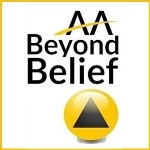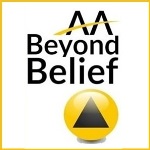This post was originally published on this site
What if the fourth chapter of the Big Book ,”We Agnostics” had actually been written by atheists and agnostics?
By John S
Originally published in September, 2014 on Secular AA Kansas City
Introduction
I wrote what you are about to read about a month after starting a secular AA meeting in 2014 with my friend Jim C. That year was an exciting time of transformation. You see, for the previous 25 years, the Big Book was the center of my AA experience. However, after realizing I was an atheist, I looked at the Big Book and my entire time in AA with fresh eyes, and to make sense of this new perspective, I started a blog that later became the website for my new homegroup. This piece was part of a series I called “The Atheist Big Book Study.” In that series, I rewrote Chapter Four in a way that was more acceptable to my atheistic viewpoint while retaining the original vernacular from 1939.
Writing this was part of my healing from coming out as an atheist in AA, which was a painful and challenging time when I no longer felt welcome or accepted. The Big Book, which I thought so vital to my recovery, became Bill W.’s metaphoric boom-a-rang “that turned in its flight and all but cut me to ribbons.” People started to use the book to put me in my place, to show me how I was wrong. Now, sadly, I realize that it was always the case. The only difference is that I am now aware of that fact.
That awareness is evidence of how much I have changed. My new homegroup, We Agnostics Kansas City, is now six years old, and during the last six years, I’ve seen hundreds of people get sober without ever reading the Big Book. These people have confirmed my view that we should build on the work of our founders, not try to replicate it. Keep what works in AA, and discard the unnecessary baggage that only serves to confuse people or to divide them into opposing camps.
* * *
In the preceding chapters you have learned something of alcoholism. We hope we have made clear the distinction between the alcoholic and the non-alcoholic. If, when you honestly want to, you find you cannot quit entirely, or if when drinking, you have little control over the amount you take, you are probably alcoholic. If that is the case, you may be suffering from an illness which we believe only an entire psychic change will conquer.
Earlier in this book, this change was described primarily with spiritual terminology which may lead one to believe that recovery is out of reach for those of us with an atheist or agnostic worldview. Happily, we found this to be an erroneous conclusion. The principles outlined in this volume translate easily into secular language, and our psychic change is just as real to us as the spiritual experience is to those who believe in God.
As first described by Doctor Carl Jung, our experiences were in the nature of huge emotional rearrangements and displacements. The ideas, emotions and attitudes which were once the guiding force of our lives, were cast to one side and replaced with an entirely new set of conceptions and motives. Our experience shows that this is possible for all alcoholics regardless of their belief system.
We need help
If a mere code of morals or a better philosophy of life were sufficient to overcome alcoholism, many of us would have recovered long ago. But we found that such codes and philosophies did not save us, no matter how much we tried. We could wish to be moral, we could wish to be philosophically comforted, in fact, we could will these things with all our might, but the needed power wasn’t there. We needed help.
Our own individual resources were insufficient to free us from the trap we created for ourselves. We could not do it alone, that was obvious. But where and how were we to find help?
Though we respect and honor the experiences of our more religious members, we agnostics and atheists do not believe this help comes from God. However, we find no conflict with those who choose to define their experience in spiritual terms. We share the believer’s humbling admission of powerlessness over alcohol and we recognize that we must seek help from a power that is greater than ourselves. For many of us who are agnostic or atheist, this power comes from the combined experience of our fellow alcoholics who preceded us in recovery.
Removing obstacles to recovery
Some of us were bothered with the thought that asking for help was a weakness. We valued self-sufficiency and we held a deep distrust toward other people. We looked askance at those who claimed to have all the answers and who knew with certainty what was best for us.
Therefore, we often found ourselves handicapped by obstinacy, sensitiveness, and unreasoning prejudice. In fact, many of us have been so touchy that even the most casual reference that we may need help caused us to bristle with antagonism. This sort of thinking had to be abandoned.
Though some of us resisted, we found no great difficulty in casting aside such feelings. When faced with alcoholic destruction, we soon became open minded and willing to accept help. In this respect alcohol was a great persuader. It finally beat us into a state of reasonableness. Sometimes this was a tedious process; we hope no one else will remain prejudiced for as long as some of us were.
Many of us were also skeptical of the idea that people with our very illness could be of any help to us at all. Let us reassure you that as soon as we were able to let go of this prejudice and express even a willingness to believe that we could be helped, we commenced to get results. We became empowered, provided we took other simple steps which were not difficult as long as we adopted the right attitude.
Our program of recovery is broad, roomy, all inclusive; never exclusive or forbidding. It is open, we believe, to everyone. We need ask ourselves but one short question. “Do I now believe, or am I even willing to believe, that I can find help in AA? As soon as one says they believe, or is willing to believe, we emphatically assure them that they are on their way. It has been repeatedly proven among us that upon this simple cornerstone a wonderfully effective structure can be built.
Why seek help in AA?
Atheist and agnostic readers may still ask why they should seek help in Alcoholics Anonymous. We think there is good reason. As agnostics and atheists we hold the view that our ideas should be informed by logic and reason. We believe truth is best discerned through observation, experience and evidence. What possible logic would lead us to seek help from a group of drunks?
Most of us have tried a variety of methods over a long period of time in an attempt to gain some degree of control over our drinking, and each attempt was met with failure. Some of us tried to stop drinking alcohol completely only to find that in this too we failed. This sad state of affairs brought us to complete desperation and a realization that we needed help. It did not satisfy us when told that we required spiritual help or that we had to believe in an unseen God. It was important to us that our sobriety be grounded in reality.
Here before us in AA we can observe many thousands of men and women who were once just as hopeless as we were, but they are helping each other not only to stay sober, but also with other problems often made more acute by drinking. We can attend meetings of Alcoholics Anonymous and watch with our own eyes as others find recovery and recreate their lives. As we listen to other alcoholics, we realize that we share a common problem, but more importantly we have found a solution in AA.
Through direct experience we have learned that together with other alcoholics we can achieve what we could never have done on our own. We have tapped into a power outside of ourselves and greater than ourselves that many of us identify as the power of good that is generated from one alcoholic helping another. We may never know how this works or how effective it is at addressing the problem of alcoholism as a whole, but we do know that it works for us, and the support we provide one another in Alcoholics Anonymous is very real.
 John S. has been sober since July 20, 1988, and spends much of his free time on the AA Beyond Belief podcast, which he has been doing now for five years. The podcast and helping start an AA group for atheists and agnostics in his hometown of Kansas City have been among his most rewarding experiences since he began his journey.
John S. has been sober since July 20, 1988, and spends much of his free time on the AA Beyond Belief podcast, which he has been doing now for five years. The podcast and helping start an AA group for atheists and agnostics in his hometown of Kansas City have been among his most rewarding experiences since he began his journey.
The post The Big Book: An Updated Chapter 4 first appeared on AA Agnostica.
